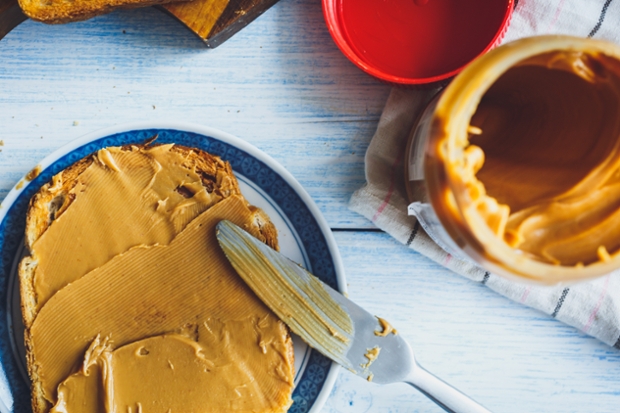Researcher develops a new, gut-healthy peanut butter
Inventor Dan Perlman ’68 reveals his new method for adding a probiotic nutritional supplement to one of America's favorite foods.
 Photo/envato
Photo/envatoA knife spreads peanut butter on toast.
Health-conscious Americans interested in probiotics have had to add them to their diet through pills or capsules, yogurt and other fermented dairy products, or certain cheeses.
Now, research scientist and inventor Dan Perlman ’68 has developed a new way to consume these beneficial gut bacteria in one of America’s favorite foods: peanut butter.
Perlman’s approach also works in other nut butters, including almond, hazelnut and cashew, and in seed butters such as soybean, chia and sesame.
Probiotics live in the gastrointestinal system, aiding digestion, helping to produce vitamins and hormones and strengthening the immune system, among many other functions.
Though the evidence is still inconclusive, they’re thought to be helpful in treating irritable bowel syndrome, diarrhea, constipation, urinary tract infections and other illnesses.
In 2012, a survey by the National Center for Complementary and Integrative Health, a government agency, found that about 4 million adults had used probiotics or prebiotics in the previous 30 days. According to MarketsandMarkets, a market research firm, the global demand for probiotics is expected to reach $69 billion by 2023, an increase of 40 percent from 2018.
About five years ago, Perlman began looking for new ways to package probiotics. He felt there were too few food options on the market and for many people, taking a pill or capsule was inconvenient or unpleasant.
Probiotics are typically freeze-dried before being added to food. Freeze drying removes the water inside the bacteria, depriving them of a key substance needed to grow.
They respond by going into a dormant state, basically a deep sleep until the nutrient and water shortage ends. Moisture in foods, even baked goods and butter, activates the probiotics to seek sustenance for growth.
But if there’s not enough water or other energy sources to sustain the bacteria, they quickly die, making it impossible for them to work their magic inside the digestive system.
As it turns out, nut butters contain very little water. When freeze-dried bacteria are added to firm peanut butter, for example, the particles become trapped in the matrix structure of the butter’s crystalline fat.
This keeps them evenly suspended in a deep sleep, still alive and ready to go to work once ingested.
Perlman devised a method to add a small amount of freeze-dried probiotic bacteria to about a teaspoon of nut oil per jar, creating a slurry. The slurry becomes firm as it’s mixed into the nut butter, which solidifies as it keeps the microscopic bacteria dormant but alive.
Perlman says there will be 500 million to 1 billion bacteria in a two-tablespoon serving of the nut butter, about the same amount that is in 1 probiotic pill.
The Office of Technology Licensing is currently seeking a commercial vendor to bring Perlman’s patented process to market.
This is not Perlman's first foray into improving foods. In the 2000s, Perlman and Professor Emeritus of Biology K.C. Hayes developed the "healthy fats" in Smart Balance margarine. His other patented breakthroughs include coffee bean flour and a drip-free wine bottle.
Categories: Research, Science and Technology





